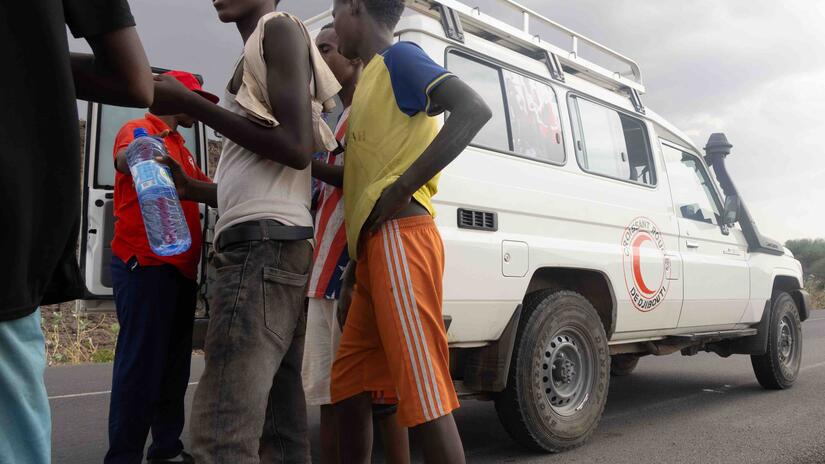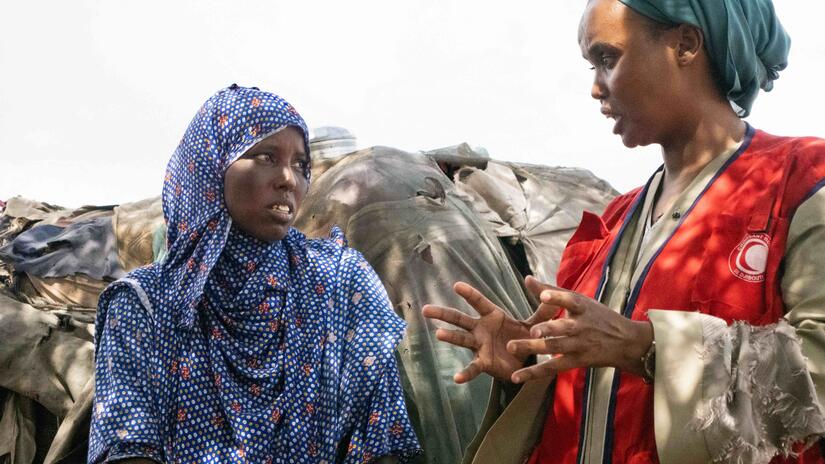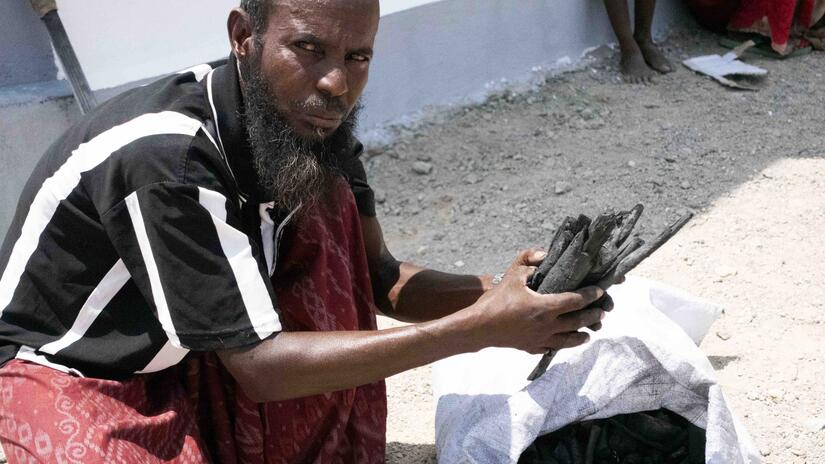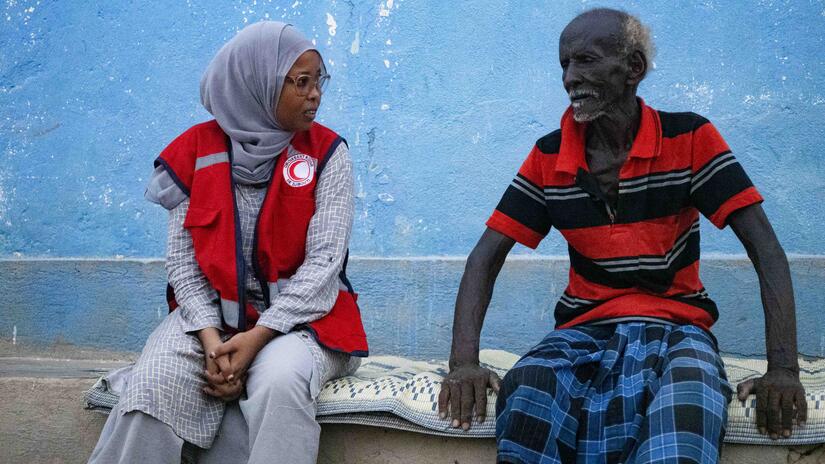“Gargaar” is a local Somali word used in Djibouti to express community solidarity. Evident throughout the country, gargaar means communities are hospitable and welcoming, ready to host and help anyone they encounter.
With fighting and insecurity in neighbouring Ethiopia and Somalia, more people are coming into Djibouti and so gargaar is on full display in many communities across the country. But with the area also going through one of the worst series of successive droughts in history, it’s clear that much more must be done to meet the mounting needs of people hit by the combined impacts of conflict, migration and climate change.
Most travel more than 500 kilometres by foot, some continuing to the Gulf countries such as Yemen and Saudi Arabia across the Red Sea. The arduous and long journey, through harsh heat, across wild terrain and over rough seas, bears a heavy toll on men, women, and children. Many die along the way.
‘By God’s grace we have made it here,” says Fatouma, who came to Chekeyti, in southwestern Djibouti, from Ethiopia with her two young children. She is exhausted and her baby is restless from fatigue. They walked over 600 kilometres in unimaginable heat, through a landscape full of hyenas and snakes, and always in danger of harassment.
“I had no choice; life was unbearable because of the clashes in Afar-Somali region and the lack of food because of drought,” she explains. “I heard life is better and more peaceful in Djibouti. We walked for days. Some days the thirst was unbearable. My children came very close to death. Some of the people we were with did not make it.”
The community in Chekyeti welcomed them to settle and even use their water from a ‘barkaad’ (an underground water reservoir) nearby. When Djibouti Red Crescent in a recent assessment asked the community leader the most vulnerable households to receive cash distribution, they did not hesitate to also nominate the Ethiopian migrants living among them.
This shows how deep rooted gargaar is in Djibouti, despite the host communities being themselves stretched of resources such as food and water. Successive droughts in the last decade means that many Djiboutian pastoralists have lost their livestock and livelihoods and have found themselves internally displaced, impoverished and dependent on humanitarian assistance.

Djibouti Red Crescent offers help to migrants along their route via mobile humanitarian service points
Photo: IFRC/Anne Wanjiru Macharia
To ‘die trying’
The generosity of strangers therefore can be a critical lifeline and the Djibouti Red Crescent Society (DRCS) plays a critical role, reaching out to people at critical points in their journey when they are most vulnerable.
Young men, some not more than thirteen years old, undertake the journey unaware of the dangers ahead. Family members back in Ethiopia invest all their life savings so these young people can search for a better life. As a result, the migrants cannot bear to turn back and be seen as failures. They often say they would rather ‘die trying’.
The DRCS therefore has endeavored to bring services through mobile units that meet many of these young men, women and children out on the migration routes. Using only one vehicle, a driver and volunteers, the Red Crescent here has assisted more than 7,000 migrants within seven months through first aid, water, energy dry food, family links and psychosocial support.
These mobile units and humanitarian service points offered lifesaving interventions in both the northern and southern parts of Djibouti’s key migration route. Unfortunately, DRCS had to stop this operation due to lack of resources.
“The situation of drought-induced hunger is alarming,” says Amina Houssein, the secretary general of DRCS. “Unemployment and low levels of social protection, along with rising food prices and very low levels of food production means families are likely to go by with just a meal a day.”
“The incidences of floods, high heat, droughts, as well as the prevalence of diseases and shocks have hit rural communities the hardest,” Hussein adds. “Our priority actions have been lifesaving basic needs assistance through multipurpose cash assistance, as well as water, sanitation and hygiene for human and animal consumption.”
Through a Disaster Relief Emergency Fund, or DREF, allocation from IFRC in August, the DRCS has been able to deliver assistance to 45,000 people. But the needs are still enormous. Projections from the Integrated Food Security Phase Classification indicate that around 285,000 people, representing 24 percent of the total Djibouti population, will be acutely food insecure, and around 100,000 people will be in emergency food insecurity, by the end of the year. More than 30,000 children under 5 years of age are also expected to face acute malnutrition this year.

Djibouti Red Crescent volunteer speaks to person displaced from her home in Djibouti and is now living in an informal settlement.
Photo: IFRC/Anne Wanjiru Macharia
Dire need of support
A small National Society of just 37 staff, five branches and some 1,000 volunteers, DRCS is committed to doing the most with its incredibly stretched resources. With availability of funds, DRCS would like to revive its Mobile Humanitarian Service Points assistance to migrants, including those who entered the country outside legal channels.
Such “irregular migrants”, as they are often called, face high vulnerability to economic exploitation by smugglers, abuse, physical and/or gender violence, potential for disease transmission, poor humanitarian conditions and loss of life.
But these are not the only challenges the National Society faces. Recent sudden floods, mostly in the highlands of neighbouring Ethiopia, has also displaced more Djiboutians and left some communities completely cut off.
“With the predicted El-Nino set to happen end of the year, we will need more help to mitigate the effects of flooding in this area,” says Mohamed Abass Houmed, governor of the Tadjourah region, which faces high risk of continued flooding. “Our biggest disadvantage is the poor shelter and road network especially in remote communities. In the event of a flood, some already vulnerable communities will be cut off”.

Many in Djibouti make, sell and use charcoal as part of their survival
Photo: IFRC/Anne Wanjiru Macharia
Surviving with cash support and charcoal
As part of its hunger crisis respone, the Djibouti Red Crescent distributed cash to a targeted 1,500 households. In one locality, they were able to do so through mobile money transfers. Meanwhile, families are doing whatever they can to survive. For most, the three rounds of cash distribution, which they used mostly for food and medicine, were not enough.
To adapt to the erratic weather patterns and make ends meet, most communities abandoned pastoralism and farming and resorted to charcoal burning. Cutting down of trees for charcoal, however, inadvertently worsens conditions and increasing their climate risk.
“Ask any community here in Djibouti what is their greatest need — you will get a resounding call for water,” says DRCS’s Houssein. “With the availability of funds, we at DRCS would additionally like to support communities through water rehabilitation projects, as well as tree planting as a mitigation measure for future climatic shocks.”





